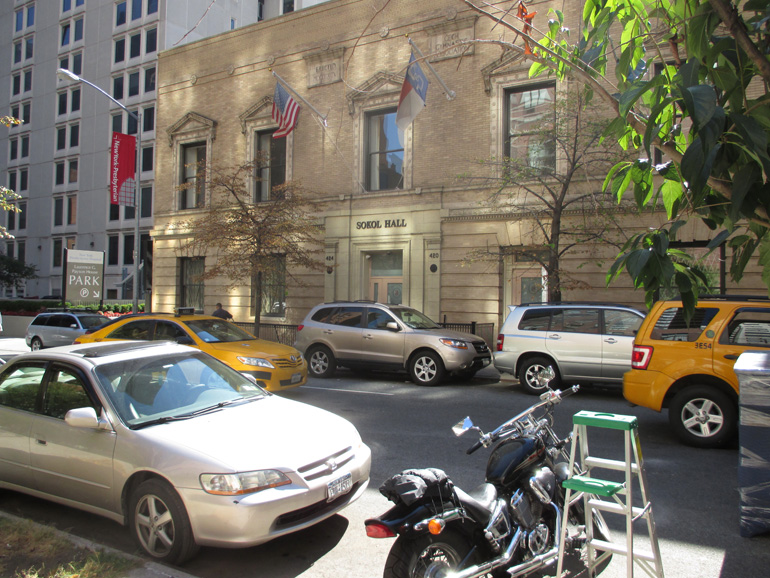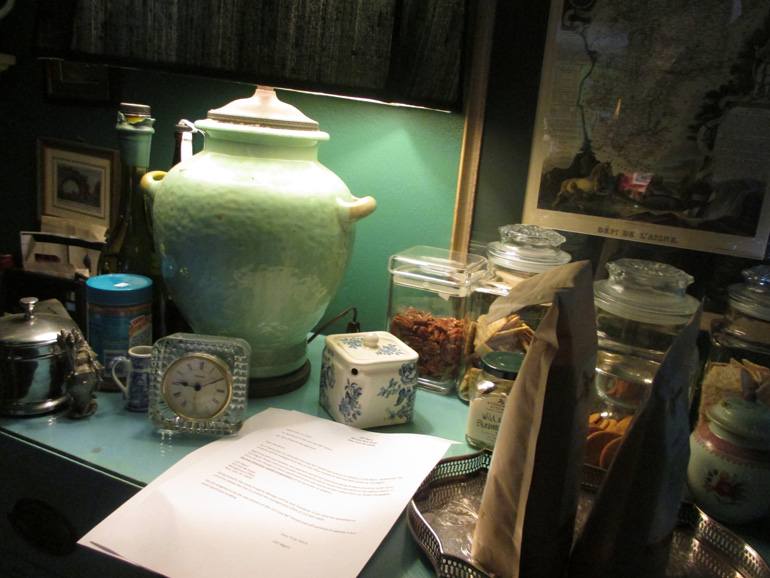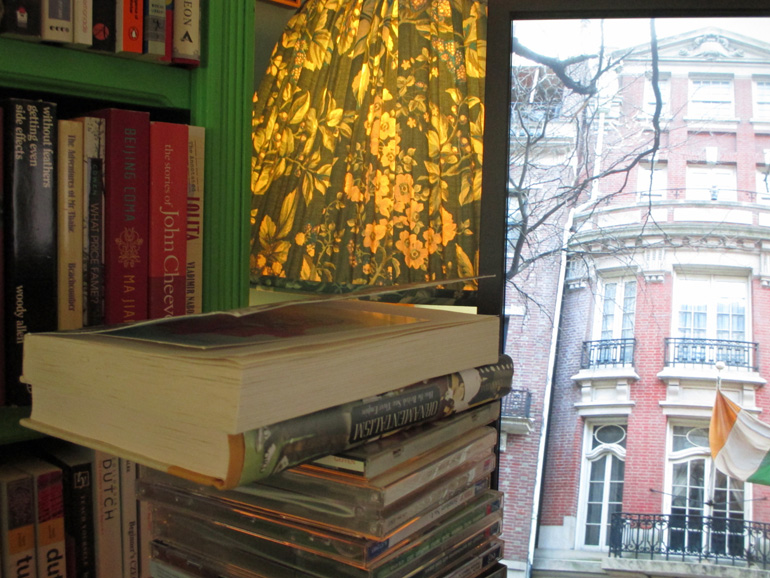Mirror, Mirror:
Morbid
30 September 2014
Tuesday, September 30th, 2014
Remicade infusion this afternoon. I’d thought it was scheduled for tomorrow, but the Infusion Therapy Unit called yesterday to confirm an appointment for today. So much the better! Of course, I’m riddled with morbid fears that something will come up to interfere. I had the same anxieties yesterday, at the cardiologist’s. Never was I so happy to see a doctor walk into the examining room (when the examining was over) with a prescription pad. This meant that I should not be going to the hospital. Going to the hospital has become a lively fear, to which I respond with the credulity of a child to the menace of the bogey-man. There is nothing wrong with the hospital, except that it is hellishly, maddeningly noisy.
The real fun comes next week, with a routine colonoscopy. I don’t mind the procedure at all, especially in its current state of evolution (with what I think they call “twilight” anaesthesia: you don’t fall asleep but you don’t remember anything). But the day before is a bore: all that fasting on chicken broth and light-colored Jell-O.
On Friday, I had moments of feeling really normal. With a few qualifications, I feel normal most of the time now. I’m still somewhat weak, not having eaten very well in three weeks (but, oh, the lost weight!), and my GI tract isn’t what it would be without the antibiotics — but then, what my GI tract would be without the antibiotics is dead, along with the rest of me. The medicine that the cardiologist prescribed yesterday, one of the oldest in the pharmacopeia, ought to settle my racing heart, and calm me down in the process — putting an end, if not to my anxieties, then to their morbid excessiveness. (Where “thinking positive” becomes the most potent of all jinxes.)
More and more, though, I feel that this bout of illness and steeply slow recovery has left some scars. Without intending to, I’ve been confronted by a lot of my old sins, and they seem more deplorable than they used to do. This is another way of saying that I haven’t really come to terms with or atoned for them. I had developed a rather rosy picture of myself, one that rested heavily on improvements (not by any means imaginary) while squinting at lapses. Many of these sins are quite familiar; they’ve simply taken on a further measure of culpability as my moral sensibility has sharpened. But some have emerged from the mists of oblivion for the first time. “Rosy” is just not on.
Last night at dinner, for example, I was having a hard time finishing the refried beans that came with my cheese enchiladas. Thinking that the beans would be more nourishing in the long term, I worked on them instead of trying the second enchilada. I had to put my fork down between bites. Kathleen and I agreed that this sort of difficulty eating was utterly unlike me; except for the occasional spot of stomach flu (to which I not prone), I always ate with relish. And this had been gone on for weeks. I was reminded of my sister, who as a child had very hard time getting through dinner. Eventually, my mother would have to sit down and feed her, a terrible humiliation. Only now, though, did I understand what a misery it must have been to eat without appetite. Kathleen asked if I ever surreptitiously swiped bits of her food, to help her out. I could not remember ever having done so.
Never, in my childhood, do I recall sticking up for my little sister, or even sensing any protective urges. I’ve always attributed this want of feeling to “the adoption,” a multi-layered trauma that began, so far as my consciousness is concerned, with finding out that my sister and I were not in fact brother and sister, nor our parents’ children, and that eventually grew into an understanding of the resentment that I must have felt when she sashayed into our lives, not as a sleeping infant but as a nine month-old cutie, sitting up and laughing and competing full time for adult attention. There was no period of adjustment for me, just a sort of magic act in which the charming personality of my sister was produced as from a top hat. No wonder I didn’t feel protective.
Last night, though, these convenient and plausible explanations disappeared just like the smoke with which surprising objects are produced from top hats. Poof! Where was the decency? Where was the fellow-feeling? I don’t mean to beat myself up, but, heavens, I must have been pretty warped to have sat complacently across the table while my sister suffered. Did I try to help once, and get caught? All I remember is a dreadful smugness. I could eat; therefore I must be better than my sister. At something. I was better in school, too — much better. But making friends was always hard for me, not because nobody liked me but because I liked nobody, a matter that I’ll explore some other time. And, outside of school, my brains were clearly a liability. My cleverness seemed best suited for getting me into trouble, with misfiring, even cruel practical jokes and sarcastic comments that were never funny enough to obscure their nastiness. So I sat at the table and did nothing, holding tight to one small measure of superiority. I could eat.
Later, I will say in my defense, I did stand up for my sister, by arguing to my parents that they didn’t understand her strengths. (It was always energizing to tell my parents that they didn’t understand things, and it still is, because if there was anything that I had no idea of, it is how right I was.) They didn’t want to understand that she would never be strong academically; it simply wasn’t the cast of her mind. But she was by no means stupid. Being told that she was, over and over again (but not by me, after a certain age), naturally induced a resentment that, having lived close it, I now understand to be quite broadly distributed among the American public. So many people have been mistreated just as my sister was, by an establishment that refused to accept the exceptional — unusual — nature of the scholarly mind, toward the development of which education was still, in those days, keyed — if in an utterly half-assed way. I do believe that, had my sister been encouraged to take up some kind of animal studies, she would have been motivated to learn enough dry material in order to pass examinations and qualify for a useful and meaningful profession. But that was no more likely in the Bronxville of that time than Marie-Antoinette’s becoming a proper French queen.
This is all very well: I grew up and got better. Story of my life. But there was a lot to get better than, continents of room for improvement. Looking back, I see an endless regression of markers — call them milestones, call them tombstones — signifying acts of thoughtless egotism or fearful meanness. I’ve always known that most of them were there, but the old rationalizations, no matter how convincing, are no longer at all emollient. And some, like the memory of sitting across from my sister in what ought to have been a fury of impatience for her to finish, but what was instead a cloud of dim satisfaction, are new.
These involuntary reviews culminate in an awful unpleasantness: How, I always end up asking myself, has Kathleen put up with me for all these years? The only explanation that stands is that she hasn’t really grasped, even yet, what a ghastly human being I am. Sooner or later, she’ll see the light, and then I’ll get what I deserve.
Like I say, morbid.















